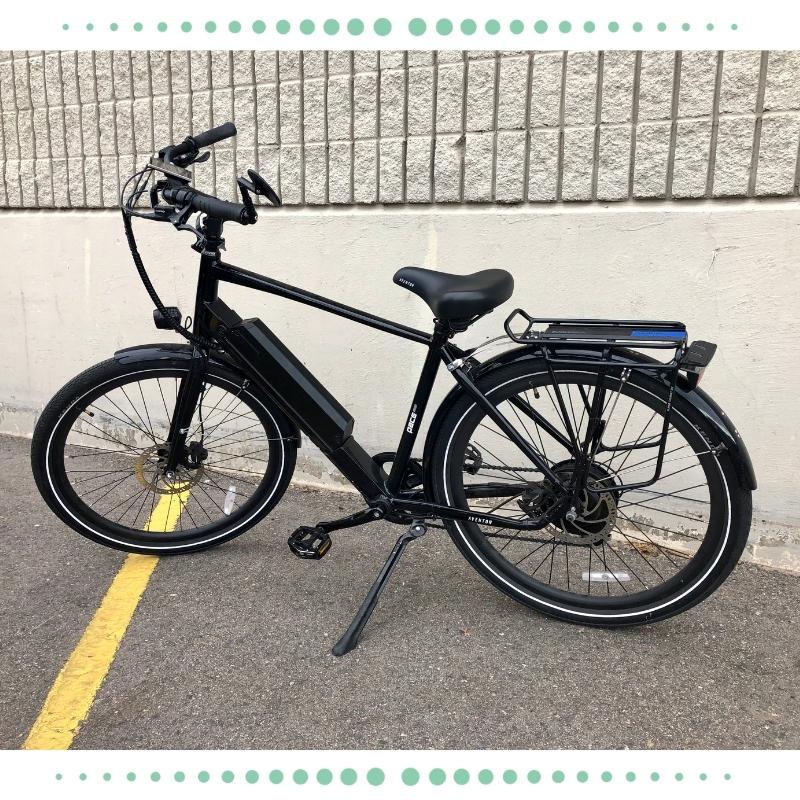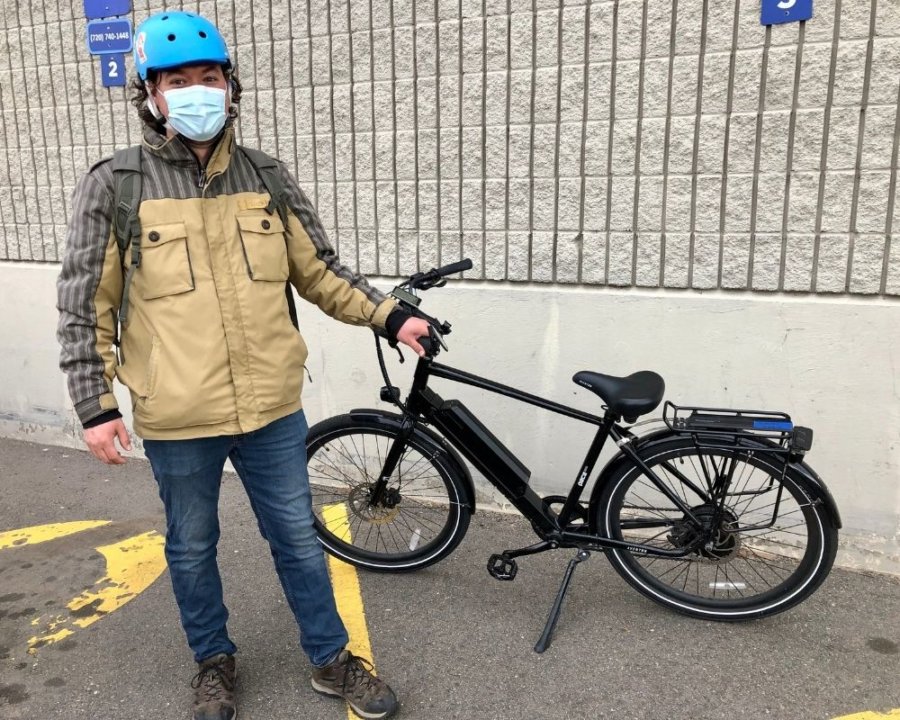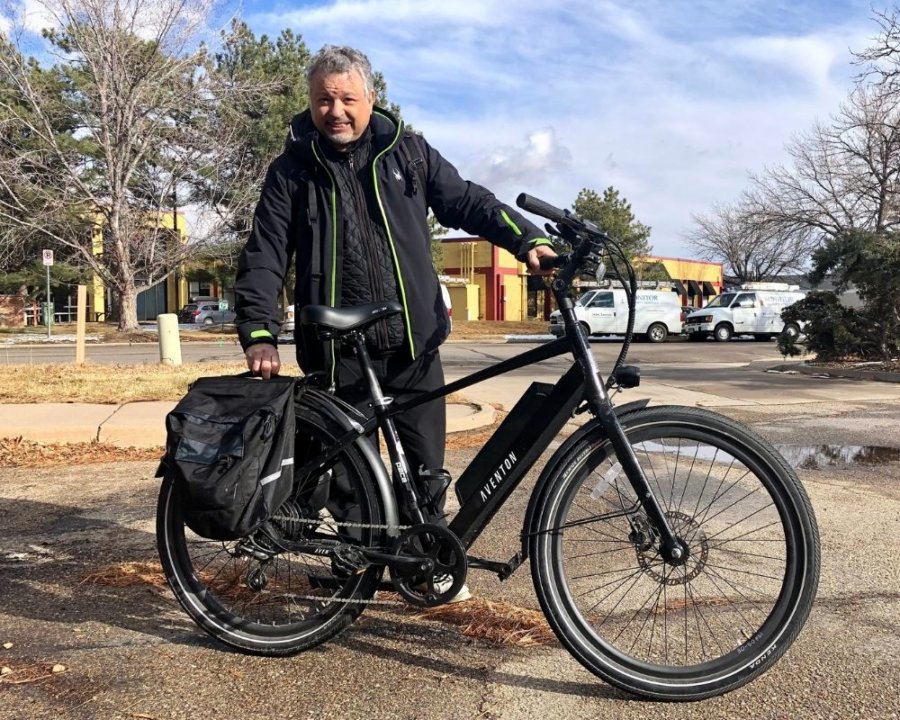169 low-income essential workers in Colorado are using eBikes purchased by the state and logging how much they use them in a special app. The Can Do Colorado eBike pilot program appears to be a hit with participants and a positive step in the transition away from fossil fuels. KGNU’s Hannah Leigh Myers reports for Rocky Mountain Community Radio.
Listen:
-
play_arrow
Successful Pilot Program Inserts eBikes Into Colorado Fossil Fuel Transition Hannah Leigh
It seems the sound of eBikes whizzing by is going to become increasingly familiar during commutes.

Sandee Cirian, eBike Program Manager at Community Cycles in Boulder, says federal data suggests eBikes should become a more familiar means of transportation. “Over 60% of every car trip is within six miles of a home and 75% of every car trip is within ten miles of somebody’s home,” says Cirian.
Those short trips mean many of us are good candidates to replace fossil fuel vehicle trips with eBike travel – A change a recent in-depth study found could cut an urban resident’s travel emission by 67% if one car ride a day was replaced with an eBike trip. The same study found if just 10% of the urban public would do the same, overall transportation emissions would fall by around 10%.
Here enters the Can Do Colorado eBike Program – After a successful mini pilot in the fall of 2020, in spring of 2021 the Colorado Energy Office awarded grant funding to 5 organizations, including Boulder’s Community Cycles. Each organization was charged with outfitting a portion of the 156 low-income essential workers participating with new eBikes and all the required accessories.

36-year old Joshua Robinson was one of the selected participants, and he’s thrilled.
It’s been an incredible blessing for me, “ says Robinson. “I was homeless on the streets for quite some time, for about a year and a half total, and having an effective means of transportation has been an incredibly amazing thing for me and I’m just so grateful.”
Robinson is so pleased by the functionality of his eBike he’s ruled out buying a car altogether.
“There’s not a lot of situations that I would need a vehicle necessarily. Even with snowboarding, there’s a bus that goes up there. And sometimes if I want a little extra range I can put my bike on the bus and then ride it from there. And especially with rates the way they are right now. I don’t know if you’ve looked at that but rates are crazy. So I don’t really see myself in the foreseeable future getting a car…or needing to get a car, really,” Robinson said.
Fellow participant Howard Treppeda agrees with Robinson that the program has had a life altering, positive effect, even though the transition to the eBike lifestyle can take some time and dedication.

“The minute I get on my bike to leave work, I’m a little tired and sometimes,” says Treppeda. “I think about taking that bus but the minute I’m out there…I think if people just give it a shot – not two weeks, they give it three months, then they wouldn’t want to do it any other way. My gas money goes towards a nice bottle of wine for the weekend.”
Can Do Colorado program participants have been logging their travel info on an app developed by the National Renewable Energy Laboratory. Senior Program Manager at the Colorado Energy Office, Sarah Thorne has been reviewing that data and she feels overall the program has been very successful.
Thorne says the positive results of this pilot program fit well with federal and state plans to encourage the use of eBikes as a means of travel in the future.
“So I think moving forward there are going to be a lot more programs available”, says Thorne. “it’s not just going to be us. It’s going to be our neighboring states, it’s going to be smaller communities – whether it’s through their utility or their local government, and that also includes infrastructure federal dollars – all of that stuff is going to be available in the next six to nine months and I think that’s really going to change what’s available to people and their ability to participate in any sort of eBike action.”
President Biden’s Build Back Better Act currently includes a $900 dollar tax credit for eBike purchases.
From the state, to the bike shop, to the participants, there was agreement on another necessary factor to making eBikes a successful part of the transition away from fossil fuels – biking infrastructure. Protected bike lanes, safe bike storage, robust trail systems and eBike compatible mounts on buses are all examples of infrastructure that keeps bike users safe and comfortable on roads, trails and when traveling in conjunction with public transit. All those things will be a must if eBikes are going to win over commuters and coax them out of their cars.
This story is part of a Rocky Mountain Community Radio reporting collaboration on fossil fuels.

-
play_arrow
Successful Pilot Program Inserts eBikes Into Colorado Fossil Fuel Transition Hannah Leigh
Podcast: Play in new window | Download

















